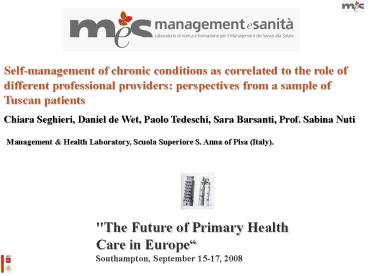Presentazione di PowerPoint PowerPoint PPT Presentation
1 / 17
Title: Presentazione di PowerPoint
1
Self-management of chronic conditions as
correlated to the role of different professional
providers perspectives from a sample of Tuscan
patients Chiara Seghieri, Daniel de Wet, Paolo
Tedeschi, Sara Barsanti, Prof. Sabina Nuti
Management Health Laboratory, Scuola Superiore
S. Anna of Pisa (Italy).
"The Future of Primary Health Care in
Europe Southampton, September 15-17, 2008
2
Introduction I
- In Tuscany, Health Authorities are now involved
in a innovation process in order to - restrain the increasing health care costs,
- respond to population aging,
- respond to the ever-increasing demand for
services and better quality of care, and - above all, respond to an increasing need of a
patient centred care. The patients empowerment
process requires a new configuration of the
relationship between physicians and patients
where the latter, now, actively participate in
treatment decisions.
3
Introduction II
- This is particularly true for patients with
chronic diseases involving patients as partners
in their care, informing them about their care
and how to manage condition related symptoms, may
lead to more effective chronic disease
management. - However, despite general acceptance of the
important role of GPs in chronic disease
management, in Tuscany, a high percentage of
chronic patients seem to receive support only
from Specialists or both Specialist and GP. - Moreover, differences have been found between
demographic groups. Lower levels of knowledge,
confidence and skills for self-management were
observed among less educated patients.
4
Research Objectives
This study aims to explore differences in patient
perceptions of the level of involvement and
expertise in the self management of their chronic
condition if followed by a General Practitioner
(GP), a Specialist or both and across demographic
groups.
5
Methods
A random sub-sample of 2186 chronic patients in
Tuscany was surveyed by means of Computer Aided
Telephone Interviews within the context of the
survey "I cittadini toscani e i servizi sanitari
presenti sul territorio" conducted in 2007 by the
Mes Lab.
6
Data
Besides patients demographics, data on chronic
care management and health care providers were
collected and analyzed. In particular, questions
focused on access to health services, to GPs
or other health professionals (i.e.
Specialist) perception of the quality of the
health professional consultation and the
information provided patients perception of
their capacity in managing symptoms and cases of
sudden deterioration in conditions.
7
Patient Characteristics (N2186)
8
Main Findings Who is the person in charge to
take care of your chronic desease?
9
Who is the person in charge to take care of your
chronic desease?
(plt.001)
10
Service utilisation
74 of the survey respondents over the previous
6 months, had made extensive use of healthcare
services declaring of having made at least one
visit to
11
..and among those patients who visited a GP or a
Specialist
(plt.001)
12
Satisfaction with the health care support
Almost all the patients declare of
being well informed
being followed adequately
independently of the health care professional
(GP, Specialist, both).
13
Level of self-management
Almost all respondents demonstrated high levels
of knowledge and confidence for self-management
Level of ability in managing cases of
sudden deterioration in conditions
Level of ability in managing symptoms
However..
14
Level of self-managemetn depending on health
professional
Level of ability in managing cases of
sudden Deterioration in conditions by educational
level (plt.001)
15
Level of self-management depending on demographics
Level of ability in managing cases of
sudden Deterioration in conditions by educational
level (plt.001)
16
Implications and Conclusions
- The survey has confirmed the importance of
- initiatives to improve patients involvement in
their - health and care. In particular
- Tuscan health managers should be aware of the
value patients place on specialist care in moving
towards a primary care model for chronic
patients. - Educational level and economic conditions should
also be taken into account in setting priorities. - GPs should be encouraged to make patients more
active in managing their disease
17
THANKS
www.meslab.sssup.it

